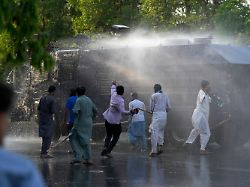After release of ex-premier
Pakistan’s government is calling supporters onto the streets
05/14/2023, 04:40 am
When Pakistan’s ex-Prime Minister Khan was arrested a few days ago, violent protests threatened to plunge the nuclear power into chaos. The former cricket star is now free. Now the government is going on the offensive.
Amid sometimes violent political clashes, Pakistan’s governing coalition called on its supporters to stage mass protests this Monday. The appeal follows the release of popular opposition leader Imran Khan, who left a courthouse in the capital Islamabad under tight security on Friday for his hometown of Lahore. Khan was released on bail.
The call for protests in Islamabad can be understood as an attempt to demonstrate the strength of the coalition government under Prime Minister Shehbaz Sharif to Khan’s supporters. A conflict between the two camps has been smoldering for months. In view of the economic crisis, the South Asian country is divided. The tensions of recent months have culminated in serious unrest after the ex-prime minister was arrested on Tuesday.
Khan has to answer in court in around 100 cases. Observers see the procedure as politically motivated. The 70-year-old is likely to speculate on re-election in the parliamentary elections planned for autumn. If convicted, he could be banned from office.
The former cricket star came to power in the 2018 general election amid allegations that the powerful military rigged the vote in his favour. Despite his great popularity, the former prime minister disappointed many supporters during his tenure. His government has repeatedly been accused of mismanagement while the country was sliding into an economic crisis. Even under Khan, the opposition at the time was paralyzed with accusations. He was finally overthrown by a vote of no confidence in April 2022.
Khan opposes the military
Meanwhile, Khan publicly challenges the military. On Saturday he renewed his criticism of the army leadership. “No one can use force to shut down a political party and put it in jail,” the newspaper Dawn quoted the former prime minister as saying. Khan again accused the military of improper interference in politics. According to “Dawn”, his speech was not broadcast on Pakistani television, although a court recently lifted a broadcast ban on his speeches.
Prime Minister Shehbaz Sharif, meanwhile, threatened those who took part in the unrest. Those responsible for “the shameful incidents of arson, looting, sabotage and damage to public and private property” should be arrested within 72 hours, Sharif wrote on Twitter. “Their cases will be tried by the anti-terrorist courts,” he added.
Pakistan has been riddled with unrest and instability since it was founded 75 years ago. The powerful military ruled for more than half of this time. And even among civilian governments, generals were seen as the force that could decide whether political leadership was successful or not. The nuclear power’s security apparatus has long been highly regarded in the fight against Islamist terror.
Khan has been fighting for a political comeback for almost a year now. He mobilized tens of thousands of supporters at nationwide events. Recent tensions erupted in November when Khan was shot at a rally. Pakistan is facing volatile, dangerous times,” commented expert Madha Afsal recently in the New York Times.
